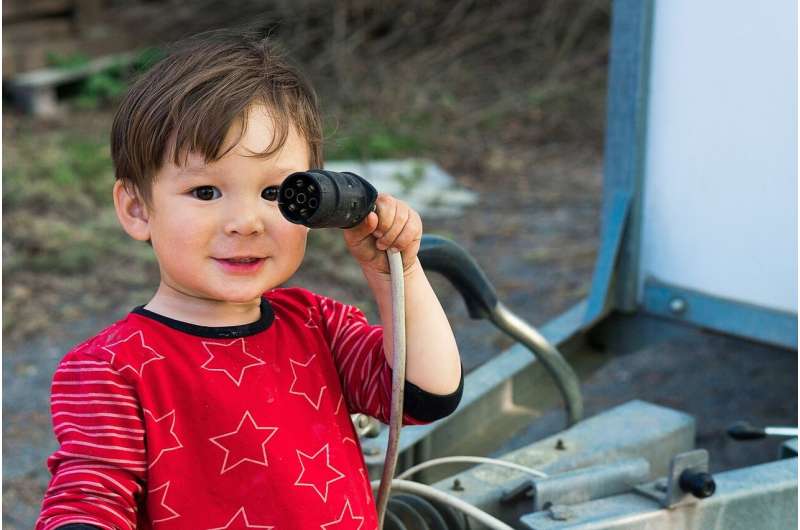Video-led feedback program reduces behavior problems in children as young as 12 months

A home-based parenting program to prevent childhood behavior problems, which very unusually focuses on children when they are still toddlers and, in some cases, just 12 months old, has proven highly successful during its first public health trial.
The six-session program involves providing carefully-prepared feedback to parents about how they can build on positive moments when playing and engaging with their child using video clips of everyday interactions, which are filmed by a health professional while visiting their home.
It was trialled with 300 families of children who had shown early signs of behavior problems. Half of the families received the program alongside routine healthcare support, while the other half received routine support alone. When assessed five months later, the children whose families had access to the video-feedback approach displayed significantly reduced behavioral problems compared with those whose families had not.
All of the children were aged just one or two: far younger than the age at which interventions for behavior problems are normally available. The results suggest that providing tailored support for parents at this earlier stage, if their children show early signs of challenging behavior—such as very frequent or intense tantrums, or aggressive behavior—would significantly reduce the chances of those problems worsening.
Children with enduring behavior problems often experience many other difficulties as they grow up: with physical and mental health, education, and relationships. Behavior problems currently affect 5% to 10% of all children.
The trial—one of the first ever 'real-world' tests of an intervention for challenging behaviors in children who are so young—was carried out by health professionals at six NHS Trusts in England and funded by the National Institute for Health Research. It was part of a wider project called 'Healthy Start, Happy Start', which is testing the video-based approach, led by academics at the University of Cambridge and Imperial College London.
Dr. Christine O'Farrelly, from the Centre for Play in Education, Development and Learning (PEDAL), Faculty of Education, University of Cambridge, said: "Often, as soon as you move a program like this to a real health service setting, you would expect to see a voltage drop in its effectiveness compared with research conditions. Instead, we saw a clear and striking change in child behavior."
Beth Barker, a research assistant at the PEDAL Centre, said: "The fact that this program was effective with children aged just one or two represents a real opportunity to intervene early and protect against enduring mental health problems. The earlier we can support them, the better we can do at improving their outcomes as they progress through childhood and into adult life."
The program, known as the Video-feedback Intervention to promote Positive Parenting and Sensitive Discipline (VIPP-SD), is delivered across six home visits, each lasting about 90 minutes.
Health professionals film the family in everyday situations—such as playing together, or having a meal—and then analyze the content in depth. During the next visit, they review specific clips, highlighting often fleeting moments when the parents and child appear to be 'in tune'. They discuss what made these successful, as well as any incidents in which more challenging issues arose. This helps the parents to identify particular cues and signals from their children and respond in a manner that helps their children feel understood and reinforces positive engagement and behaviors.
The 300 participating families all had children who scored within the top 20% for behavior problems during standard healthcare assessments. Misbehavior is a normal part of toddlerhood, and not all of the children would necessarily have gone on to develop serious problems. All were, however, deemed 'at-risk' because they exhibited challenging behaviors like tantrums and rule-breaking more severely and frequently than most. These are often the early symptoms of disruptive behavior disorders and typically emerge at 12 to 36 months.
The researchers used various tools, principally interviews with the parents, to assess each child's behavior before the trial, and again five months after. Each child received a score based on the frequency and severity of challenging behaviors including tantrums, 'destructive' behaviors (such as deliberately breaking a toy or spilling a drink); resisting rules and requests; and aggressive behavior (hitting or biting).
Between the assessments, all 300 families received the routine healthcare available to them for early symptoms of behavior problems. The researchers describe this as 'typically minimal', as there is currently no standard pathway of support for behavior problems in such young children. Only half of the families were given access to the parenting program.
In the second assessment, five months later, children from families who received the extra video feedback support scored significantly lower for all measures of behavior problems than those who only received routine care.
The average difference between the scores of the two groups was 2.03 points. While the exact meaning of this varied depending on the specific problems exhibited by the child, the researchers describe it as roughly equivalent to the difference between having tantrums every day, and having tantrums once or twice a week. Similarly, in the case of destructive behaviors, it represents the disparity between regularly throwing or breaking toys and other items, and barely doing so at all.
Encouragingly, 95% of the participants persevered with the trial to its conclusion, suggesting that most families are able to accommodate the visits.
Paul Ramchandani, Professor of Play in Education, Development and Learning at the University of Cambridge, said: "To provide this program in any health service would require investment, but it can realistically be delivered as part of routine care. Doing so would benefit a group of children who are at risk of going on to have problems with their education, behavior, future wellbeing and mental health. There is a chance here to invest early and alleviate those difficulties now, potentially preventing problems in the longer term that are far worse."
The results are reported in JAMA Pediatrics.





















